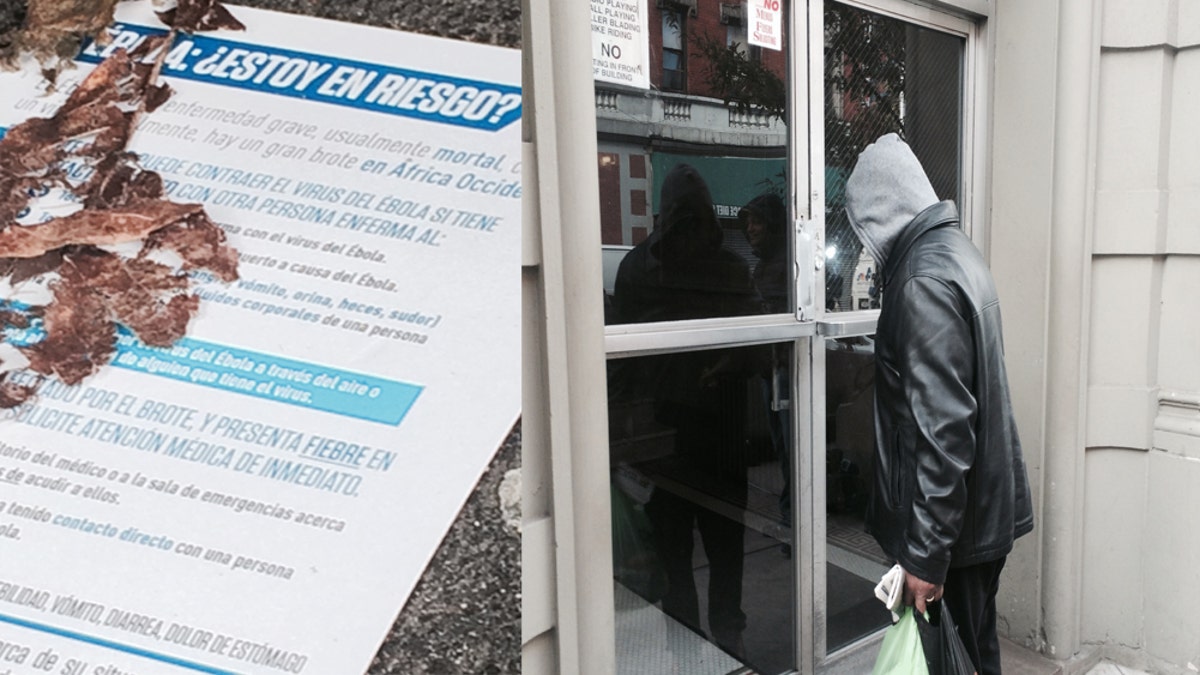
New York – A day after a doctor was confirmed as the first Ebola case in New York City, residents in his largely Hispanic neighborhood in Harlem said they were on edge now that the disease that has gripped the nation is so close to home.
Dr. Craig Spencer, who was working for Doctors Without Borders treating patients with the deadly virus in Guinea, had returned to the city October 17 from Brussels, Belgium after concluding his work in the West African nation October 12. Spencer, a 33-year-old emergency doctor who works at Columbia-Presbyterian Hospital in Manhattan, was rushed to Bellevue Hospital on Thursday with a fever that rose up to 100.3 degrees Fahrenheit.
"It's a little mind-blowing. It is devastating actually to think somebody in your neighborhood carries the disease that has taken over right now," Aaron Ferreira, 24, told Fox News Latino. "This is your place of peace, your neighborhood, your community. It is hard to take in right now, especially with all these reporters."
Spencer lives in the primarily Dominican and Puerto Rican upper Manhattan neighborhood of Hamilton Heights. Officials there have stepped up their Spanish-language outreach campaign to inform neighbors and local residents about any possible threats they face from Spencer’s illness.
The diverse neighborhood, like many others in New York City, has gentrified in recent years and now has a growing white population that has moved in during the past decade. People spent the day Friday gathering in bodegas to talk about the doctor with Ebola and many still didn't understand how the disease can spread.
- Ebola diagnosis in New York sparks worry in patient’s Upper Manhattan neighborhood
- Ebola: Spain gives U.S. go-ahead to use bases to fight outbreak in West Africa
- As Ebola crisis worsens, Fidel Castro says Cuba willing to work with U.S. to fight disease
- Rwanda backtracks on decision to screen U.S. and Spanish travelers for Ebola
- Cuba emerges as committed ally against Ebola – yet can’t treat illnesses at home
- Best pix of the week
- Best sports pix of the week
- Jobless Mexicana Flight Attendants Pose for Calendar
Meanwhile, city health officials were canvassing the neighborhood and handing out leaflets to worried residents.
Carmen Boon, a spokesperson for the office of New York City Bill de Blasio, told Fox News Latino that Deputy Mayor for Health and Human Services Lilliam Barrios-Paoli will be speaking in Spanish following de Blasio’s remarks and that “the health department has been releasing information in Spanish by way of community outreach, website, social media.”
While Boon did not go into specifics on what the city is doing in regards to reaching the Spanish-speaking community, the website for the city’s Department of Health and Mental Hygiene provides all of its community resource bulletins about Ebola in Spanish as well as a number of other languages including in Arabic, Russian and Chinese.
The Centers for Disease Control and Prevention’s website also provides all the information on the Ebola virus in Spanish as well as English.
Despite the amount on information available about the virus and repeated statements by officials on all levels, concern that Ebola may spread through the city of 8 million people – and specifically in Spencer’s neighborhood – is still run high.
Ferreira said many people in his neighborhood might not be too well informed on how the disease can be transmitted and added that those in his age group are getting the majority of their information throughout various social media platforms.
"I think that people around here in this area are not too familiar with the disease…Right now it's social media – Instagram, Facebook and Twitter – what kind of engages you in today's world. So I don't really think they know,” he said. “Right now I feel like a lot of people are scared because they don't know how it's transmitted or how you get the actual disease.”
Workers spent Friday shuffling in and out of the building where Spencer has an apartment on the first floor. Two members of the Sanitation Department's Environmental Police Unit were at the building along with a crew that specializes in crime scene cleanup and bio remediation.
Stan Malone, who lives across the street from Spencer’s apartment, said his family members live on the fifth floor of the building and temporarily moved out.
Malone was shocked that Spencer had been in New York City for so long despite developing symptoms recently.
City officials said Thursday that Spencer had undergone the proper screening tests upon his arrival at John F. Kennedy International Airport.
"When it hits home (you're scared). This has hit home (for) all of us," Malone said. "How in the world can this man be over in West Africa treating these sickly people and get through? That's a question to be asked. He was over there treating them. All of this could be avoided honestly."
According to José García, who works as handyman with the superintendent of the building where Spencer lives, residents were expressing a level of anxiety after the word broke out. But he said he wasn't too worried about an outbreak.
He pointed out the job officials did in trying to ease the alarming situation after Spencer was transported to the hospital.
"They acted in a quick manner,” he said. “All of their teams worked quickly."
